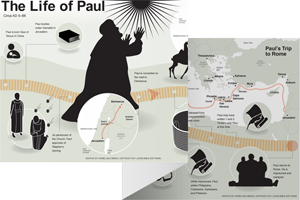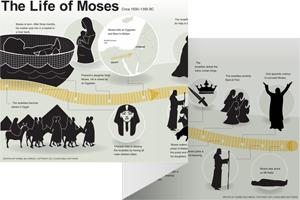9:1–9 The gospel witness has extended from Jerusalem to Judaea and Samaria. Now, God begins to build the Church to reach the farthest parts of the earth (1:8). The conversion of Saul (who is also called Paul) will launch a full-fledged mission to the Gentiles. |
 Paul: A Life of Redemption and Transformation
Paul: A Life of Redemption and Transformation
 Jesus and His Witnesses as Prophets in Luke—Acts
Jesus and His Witnesses as Prophets in Luke—Acts
9:1 threats and murder Saul may not have been the actual executioner, but his arrests led to the imprisonment and deaths of many in the Church. See 22:4; 26:10; and Gal 1:13.
9:2 Damascus A city in modern-day Syria, northeast of Jerusalem. It was an important commercial center and a key stop along the trade route between Egypt and Mesopotamia.
in modern-day Syria, northeast of Jerusalem. It was an important commercial center and a key stop along the trade route between Egypt and Mesopotamia.
the Way An early name for the community of those who confessed Jesus as Messiah (compare John 14:6; Acts 19:9; 24:14).
9:3 flashed around Light suddenly and overwhelmingly enveloped Saul.
 Paul: A Life of Redemption and Transformation
Paul: A Life of Redemption and Transformation
9:4 falling This experience of Jesus’ glory is so overwhelming that it forces Saul to the ground (compare Ezek 1:28; Dan 10:9; Rev 1:17).
Saul, Saul Jesus’ repetition of Saul’s name may suggest a sense of urgency or of compassion (compare Luke 10:41; 22:31).
why are you persecuting me In persecuting the Church, Saul persecutes Jesus Himself.
9:5 Who are you, Lord Saul’s question, as well as Jesus’ response with the words “I am” (egō eimi in Greek), may be an allusion to Moses’ encounter with Yahweh in the burning bush (Exod 3:14). Like Moses, Saul is here being called by Yahweh to rescue a people (in Saul’s case, the Gentiles).
 Resurrection Appearances of Jesus Table
Resurrection Appearances of Jesus Table
9:7 saw no one Compare Dan 10:7.
9:8 he could see nothing Saul’s physical blindness may be the result of the intense glory of Jesus’ appearance, or it may be an outward manifestation of his own spiritual blindness that he (ironically) has just begun to see for the first time. It could also be Jesus’ way of humbling Saul.
9:9 he did not eat or drink Jesus had just turned Saul’s understanding of God, Scripture, and his own identity and values upside down (compare Rom 10:1–4; Gal 1:11–17; Phil 3:3–11). Saul’s fast may be a response to this.
9:10–19 Through Jesus’ words to Ananias, the significance of Paul’s experience on the road to Damascus is revealed. |
9:11 the street called ‘Straight’ A major road in Damascus.
9:13 I have heard Ananias is concerned; the Lord is sending him to a vicious persecutor of the church.
9:15 chosen instrument There is irony surrounding the name of Jesus in His dialog with Ananias about Saul. Ananias objects that Saul has persecuted those who call on Jesus’ name (Acts 9:14); Jesus reveals that He has chosen and transformed Saul precisely so that he will carry that name to the Gentiles—and even suffer for it (v. 16).
9:16 suffer Compare 2 Cor 11:16–33.
9:17 Brother In welcoming Saul in this way, Ananias displays both his obedience to Jesus’ call and Saul’s full inclusion in the fellowship of the Church.
filled with the Holy Spirit Saul now receives the empowering of the Holy Spirit for his mission to the Gentiles (compare Acts 2:4). This is an anointing to fulfill a specific calling and mission placed on Saul by God.
9:18 scales This could be a figure of speech meant to depict the sense of suddenly regaining sight.
 Miracles in Acts Table
Miracles in Acts Table
9:20–25 This section shows the suddenness and genuineness of Saul’s conversion, and begins to fulfill Jesus’ promise about how He will use Saul (v. 15). |
9:20 immediately Saul has been radically transformed; he now uses his extensive training and zeal to build up and defend the gospel rather than to attack it (vv. 22; 18:28).
Son of God In the ot, being a son of God usually belongs either to Israel in general (Exod 4:22) or to the Davidic line in particular (2 Sam 7:14–15). The ultimate Israelite and descendant of David, the Messiah, is identified as God’s Son (Psa 2:7). Compare Gal 1:16; 2:20.
9:23 many days This may allude to the time Paul sojourned in Arabia and returned again to Damascus before going to Jerusalem (Gal 1:17–18).
do away with him The Jews in Damascus could not argue against Saul’s powerful preaching and reasoning from the Scriptures, so they sought to kill him.
9:24 both day and night Initially one of the greatest threats to the Church, Saul’s witness is now an equally serious threat to the Church’s enemies.
9:25 in a basket Compare 2 Cor 11:32–33.
9:26–31 The Church in Jerusalem becomes convinced of Saul’s conversion, and the apostles affirm him and his ministry. |
Event | Approximate Date |
Paul’s conversion | ad 33 |
Paul in Arabia | ad 33–35 |
Paul’s visit to Jerusalem | ad 35 |
Paul in Syria and Cilicia | ad 35–48 |
9:27 Barnabas Barnabas, who was already well known and respected (Acts 4:36–37; 11:22–24), had listened to Saul’s story and gives Saul credibility with the church and its leadership.
9:28 going in and going out Similar language is used to describe Jesus’ life and ministry among the disciples (1:21).
9:29 Greek-speaking Jews Refers to Greek-speaking and cultured Jews. Stephen’s initial dispute was with a similar group in 6:9–10. See note on 6:1.
9:30 Tarsus The birth city of Paul (see 22:3).
9:31 Luke (the narrator) highlights the successful beginnings of Christ’s promise to the apostles about the spread of the gospel (1:8). |
peace This could refer primarily to the Church’s contentment in the face of persecution, or to their internal unity and camaraderie.
strengthened Despite persecution, the Church was growing both in number and in maturity (compare 4:4).
9:32–35 Like Philip (8:40), Peter proclaims the good news along the Mediterranean coast. |
9:32 in Lydda Located about 10 miles inland from Joppa.
9:33 Aeneas A Greek name; Aeneas is likely a Hellenistic Jew (compare v. 29 and note).
 Miracles in Acts Table
Miracles in Acts Table
9:35 who lived in Lydda and Sharon Refers to the area of the coastal plain. At first the church interacts with those who have been influenced by non-Jewish people (the Gentiles)—the Samaritans and Greek-speaking Jews. Now God moves Peter closer to the Gentiles.
9:36–43 Dorcas’ resurrection shows Jesus’ power over life and death. The event also calls Peter to Joppa, marking the next step in the Church’s mission to the Gentiles. |
9:36 Joppa An important Roman-controlled port city.
Tabitha Based on her name, she was likely a Jewish believer who also had a Greek version of her name.
9:37 upstairs room This location creates an echo with the miracles of two of Israel’s great prophets (Elijah and Elisha) and Jesus’ miracles (1 Kgs 17:19; 2 Kgs 4:10; Luke 4:25–27; 8:49–56).
9:39 all the widows Dorcas’ ministry among widows is testimony not only to her godliness and compassion, but to her importance for the community (compare note on Acts 9:36).
9:40 Tabitha, get up This scene especially evokes Jesus’ raising of Jairus’ daughter (Luke 8:54).
9:43 a tanner Simon worked with dead animal carcasses, a job inherently unclean by Jewish standards (Lev 5:2; 11:24). Peter has moved to a region requiring him to interact with, and even stay with, Jews who are more influenced by non-Jewish culture and traditions.

|
About Faithlife Study BibleFaithlife Study Bible (FSB) is your guide to the ancient world of the Old and New Testaments, with study notes and articles that draw from a wide range of academic research. FSB helps you learn how to think about interpretation methods and issues so that you can gain a deeper understanding of the text. |
| Copyright |
Copyright 2012 Logos Bible Software. |
| Support Info | fsb |
 Loading…
Loading…



